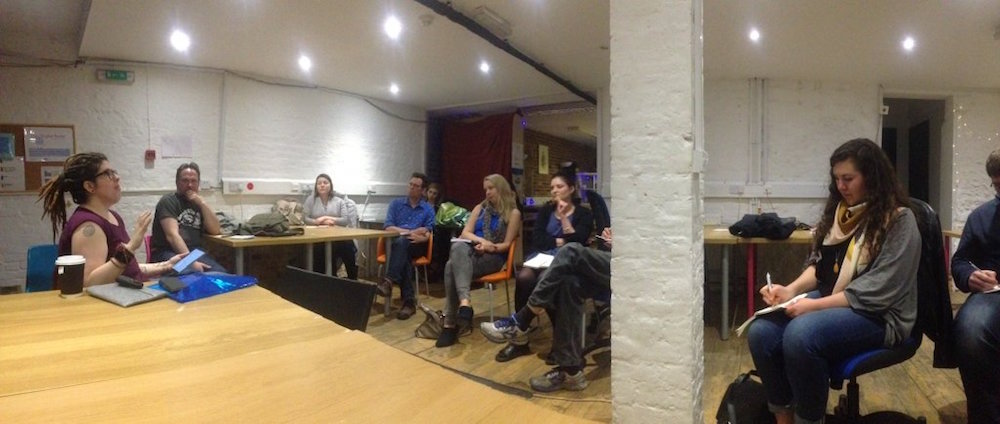Statistically, you’re probably a bit scared of applying to speak at WordCamp.
According to my quick Google research, around 75% of people suffer from a fear of public speaking.
I am one of the 75%.
So when Tammie Lister said she was doing a ‘Get Speaking’ workshop at WordUp Brighton, I decided I’d go along to try and get over my fear.
Why we avoid public speaking and why we should do it anyway
A couple of people at the workshop said they enjoy public speaking. But most didn’t.
Some reasons attendees gave for avoiding public speaking:
- Worrying about being wrong
- It’s easier not to speak
- Because of a bad experience
- Being ignored in the past
- The Q and A bit at the end is tricky
- Difficulty coming up with a new idea
There are all sorts of reasons that put us off speaking in public.
But there are so many more important reasons to just go for it:
- It makes you look good
- It helps you progress your career
- It’s fun
- It’s great for networking
- It’s a chance to give something back to the WordPress community
- You can be a role model for others
Coming up with an idea
Putting our fears to the back of our minds, we all came up with ideas for our own talks.
The title sells your talk to your audience.
And while you want to catch people’s attention, it’s also good to be clear what you’re going to talk about.
A simple, descriptive title is often better than a too clever, cryptic one.
If, like me, you’ve never spoken at WordCamp before, you probably have lots of ideas bursting to get out.
Take five minutes and try it now…
…
…
Once we’d sorted our topics, we came up with short descriptions of our talk. This description shouldn’t need to be more than 200 words.
Want to try it too?
Take five minutes to come up with your description now.
If you’re struggling to describe your talk, how about asking a question and describing how you’ll answer it.
Don’t give everything away though – you’ll have plenty of time for that when you present your talk.
…
…
You don’t need to write your speaker application for WordCamp Brighton. You can make a video or do a sketch instead. It’s up to you.
Take a look here for more information.

Planning your talk
When it comes to preparing your actual talk, it’s a bit like coming up with a story. It needs a beginning, a middle and an end.
Everyone plans their talk differently.
You might find it easier planning your slides first.
Or, you might focus on writing your talk first.
However you go about it, Tammie had some handy pointers:
- It’s a good idea to have a theme for your slides – in terms of colours and fonts.
- Don’t write out everything you’re going to say on the slides. Think of them like a backdrop.
- Check your font sizes are big enough for people sitting at the back.
- Check copyright rules for any images you use and include sources. You could even draw your own doodles using an app like Paper – see my attempt below.
- Think about accessibility, including checking your font choice and colour contrast.
- It’s useful to include links to your resources at the end of your talk. That way your audience can sit back and relax during your talk.

There are lots of talks from past WordCamps over on WordCampTV. Check it out for inspiration.
Overcoming fear
As the time to get up on stage and give your talk gets nearer, how do you overcome nerves?
The more you’ve rehearsed your talk, the easier it’ll be.
Make sure you’ve slept well the night before you’re due to give your talk.
On the day you give your talk, wear clothes you feel comfortable in and stay hydrated.
As you’re getting ready to go on stage: relax and breathe. You could try the 4:7:8 pattern of breathing. Breathe in for a count of 4, hold for 7 and breathe out for 8.
And think how amazing you’ll feel once your talk is done.
Want even more tips? Check out these useful Get Speaking resources.
Want to be even more relaxed?
The day before WordCamp Brighton 2016, we’re organising a special opportunity for all the speakers to get together.
We’re keeping the details quiet at the moment. All I can say is: it’s going to be really fun.
We’re planning something that will give you a chance to meet and bond with other speakers.
You’ll also have plenty of opportunity to check out the stage where you’ll be speaking.
It’s time to apply
There’s still time to apply to speak. Applications close on 9th May 2016, so go ahead and apply today.
We can’t wait to hear what you have to say and give you a high five after your talk.
And if you want any help or advice, now or in the lead up to WordCamp, contact us here.